#music revenue streams
Explore tagged Tumblr posts
Text
Hind's Hall 2 is out guys!
Streaming revenue will be donated to the United Nations Relief and Works Agency, so yeah go stream peoples.
#hinds hall#hind's hall#palestine#macklemore#anees#mc abdul#amer zahr#stream revenue will be going to unrwa guys#Spotify#hind's hall 2#hinds hall 2#music#new music friday#new music
122 notes
·
View notes
Photo
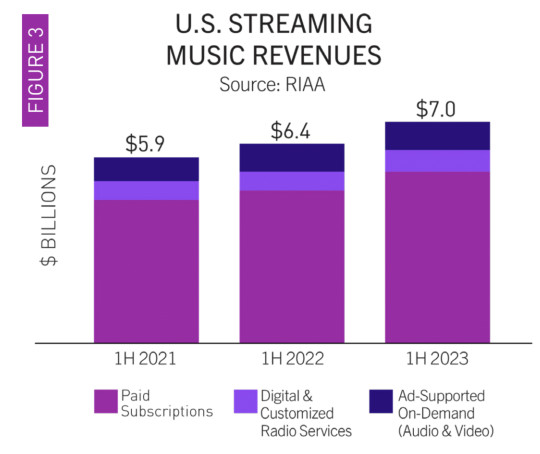
(via Music industry revenue hits all-time high - The Verge)
and independents artists get...

488 notes
·
View notes
Text
idk i am curious what it’ll sound like especially with “how to love”, everyone knows i am a ready to love enthusiast, but i just have to wait and see cause that makes me feel weird
#now feels like an especially good time to remind everyone to boycott#any content they put out you can download it to watch and not give hybe any revenue that’s what i’ve been doing#don’t buy albums don’t stream their music etc etc you know the drill#theo.txt
2 notes
·
View notes
Note
whats your honest opinion on monitor party?
I personally would not pay for most add-on fan experiences so I'm an annoying person to ask. If handing over triple figures towards a hobby farm and rv glamping will quell something in you... we are not the same. But if you're determined to do something extra, monitor party being twice the price when the main sell is an individual photo vs a group is a fucking joke. At least soundcheck offers an experience + you get ee if you want to be in front. Monitor party is fake vip that hands you items that only feel special if they're organically gotten in the crowd. I don't want to be handed a bag of picks, I want Alex to hit me in the eye with it or catch Jack's straggler on the floor. Signed setlist? nah I wanna know I fought for that crinkled, wet piece of paper. These things that should come with a story being sold are so fucking uninteresting to me. People who have money to waste love to lean all the way into the bullshit capitalism but god it's so boring.
#I've never been against paid m&g. time is valuable and the music industry has few revenue streams for artists.#but this shit is so much money for what?#atl band#answered ask#i just really want people to think about what the fuck they're spending their money on in all aspects of life#I also want to rip people from a barricade they paid to be on but that's an old person problem
1 note
·
View note
Text
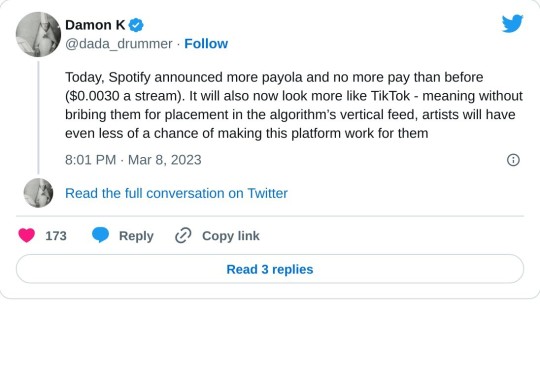
#Spotify#payola#Bandcamp better#TIDAL better#Apple Music better#Apple Music pays artists about the same though#Surprisingly Napster paid a lot of streaming revenues compared to the others#Can't go wrong with Bandcamp#they have playlists now
2 notes
·
View notes
Text
Hiya, this is not what I've heard so far actually. As a small artist who releases through Spotify what I've heard is still insidious but not this exact thing.
So, from what I know, Spotify and Universal Music Group have stuck a deal to put any money from smaller artists under the 1000 stream threshold into a pot that will be used for universal music. The artist would not receive any of their streaming revenue until they hit that threshold (update and if they don't hit it writing 12 months, they do not get it). That is disgusting, and hopefully, unions like this will take action against this vile corporate greed.
This post will keep being updated as I gather more information.

13K notes
·
View notes
Text
since the beginning of 2021, i have saved $5 every month by cancelling spotify premium and switching over to a cracked version of YT premium/YT music. the cracked version of YT premium was discontinued a while ago but the cracked YT music app has been going strong much longer than i thought it would.. up until today. not only was my music distorted and pitched down on the YT music app, it was also broken on the browser version of YT. everything else works fine which i'm thankful for because i was really stressing out thinking my phone was broken in some way. but unfortunately, this means i need to fuckin cave and get spotify premium again >:( fuck spotify for making "free" spotify unusable. 've only played a few songs just to test the audio quality so this is just with my vague memory but like.. please guys. the fact that they even double check WITH YOUR COLLEGE if ur still enrolled is fucking bonkers to me. like i could eat the cost and be fine but out of principal i just don't wanna do it lol. like i've already saved a lot of money by making the initial switch over and im happy with myself but ahh idk. i will admit, although i never really liked the layout of spotify that much for some reason, they really got me with the auto generated playlist when i made a new account (with the student email from my current uni for another student discount hopefully) my complaint with YT music was that the autoplay was the most nonsensical thing imaginable. it wouldn't even suggest music that was remotely in the right ballpark of what u were previously listening to. it gave me whiplash every time. i was fine with it because i wasn't paying for it the actual quality of the app is just not worth money. lower quality transitions, hard to navigate interface, poorer audio quality.. etc.
#ok for a while#i worried that the cracked YT music streams would hurt the revenue of my favorite indie musician#so for a while i was subscribed to his bandcamp#i forgot why i stopped the subscription. being a college student in america means i'm under constant financial stress#also#i honestly probably would've been paying $10 a month this year#because i think there's a maximum amount of time u can have the student discount#and ive been in college for 5 years ummmm...
1 note
·
View note
Text
Online Music Market Trends, Players, and Future Outlook
Introduction:
The online music market has experienced a truly remarkable ascension in recent years, driven by the digital revolution sweeping across the music industry. To fully grasp the current landscape, we must delve into key aspects such as market size, growth trajectory, revenue streams, prevailing trends, influential players, and the promising future that lies ahead.
Online Music Market Size, Share, and Growth:
The online music market has witnessed exponential growth, reaching a staggering USD 39.52 billion in 2023, marking a 14.7% increase from the previous year. This remarkable growth can be attributed to the ever-increasing popularity of streaming platforms and the widespread adoption of digital music services across the globe. Streaming reigns supreme, accounting for a dominant 70.8% share of the total revenue generated within the online music market.
Digital Music Market Trends:
Several compelling trends are shaping the digital music landscape:
Shifting from Ownership to Access: Consumers are increasingly embracing subscription-based models, favoring access to vast music libraries over purchasing individual songs or albums.
Personalized Experiences: The rise of personalized playlists, algorithm-driven recommendations, and high-fidelity audio formats are significantly enhancing the overall user experience.
AI and Machine Learning Integration: The integration of artificial intelligence (AI) and machine learning has become a game-changer, empowering platforms to analyze user preferences and tailor content accordingly. This not only fosters user engagement but also allows platforms to anticipate and cater to evolving consumer demands.
Online Music Industry Players:
The online music industry is a dynamic ecosystem teeming with key players vying for market share. As of the latest data, Spotify remains a frontrunner, boasting over 433 million active users and a staggering 182 million paying subscribers. Apple Music follows closely behind with a subscriber base of 80 million, highlighting the fierce competition within the market.
Beyond dedicated streaming platforms, social media has emerged as a significant player in the online music landscape. Platforms like TikTok and Instagram have transformed into influential hubs for music discovery and promotion, allowing artists to reach wider audiences and gain recognition.
Online Music Market Future Outlook:
Looking ahead, the future of the online music market appears resoundingly promising, driven by continued advancements in technology and the ever-evolving preferences of consumers. Projections suggest that the market will surpass USD 103.07 billion by 2030, fueled by the increasing penetration of high-speed internet and the widespread adoption of smart devices.
The demand for exclusive content and original programming is expected to rise, leading to strategic collaborations between streaming platforms and artists or record labels. As 5G technology becomes more prevalent, it will further revolutionize the online music experience by enabling faster streaming and immersive audio-visual content.
In conclusion, the digital music market has become a powerhouse within the broader music industry. With an impressive market size, continuous growth, and innovative trends shaping the future, the industry is experiencing a transformative era. As key players continue to vie for dominance and technology evolves at an unprecedented pace, the future outlook for the online music market remains bright, promising a harmonious blend of innovation and accessibility for music enthusiasts worldwide.
#online music streaming market share#recorded music market#online music player project report#online music revenue#online music market share#online music market size#music streaming service market#music industry#global music#digital music market#market research#business#ken research#market analysis#market report#market research report
1 note
·
View note
Text
Japan's Love for CDs Still Strong After 40 Years
Yo, it's been forty years since the first compact disc dropped, but CD sales in Japan still hold strong, even with all the online streaming services out there.
Back in the day, people loved CDs for their ease of use, but nowadays, fans buy them to show support for their favorite artists or as collector's items.
The first CDs to hit Japan were Billy Joel's "52nd Street" and Eiichi Otaki's "A Long Vacation" on Oct. 1, 1982. They were only 12 centimeters in diameter, making them smaller and lighter than vinyl records, which were the go-to before CDs took over.
One of the big benefits of CDs was that they eliminated the crackling and hissing that came with analog formats like tape and vinyl.
Philips and Sony worked together to develop CD technology, but they had different ideas about the specs. Philips wanted CDs to hold 60 minutes of music and have an 11.5 cm diameter, while Sony pushed for a 12 cm diameter and 75 minutes of music to fit Beethoven's Symphony No. 9 on one disc. The standard CD format hasn't changed since then, even though there have been other types of CDs developed over the years, like 8 cm discs and Blu-spec CDs that have higher fidelity.
Hirofumi Nakayama, Vice President of Sony Music Studios Tokyo, said, "It proves that the specs that were initially decided were not wrong. The sound quality suits human ears. That’s why they’ve been loved for so long."
CDs overtook analog records in 1987 in Japan and reached a peak of ¥587.8 billion in 1998. Since then, CD sales have fallen gradually, partly because of online music distribution. In 2021, the market was worth about ¥123.2 billion, only about a fifth of the peak value.
Despite the rise of streaming services worldwide, physical formats like CDs and records are still popular in Japan. In the US, CDs and records only made up 10% of music revenue in 2021, but in Japan, they accounted for about 70%, more than twice as much as digital formats.
To cater to pop and K-pop fans, music labels often release different versions of CDs with alternate jackets, track lists, or event tickets. And CDs that have exclusive songs not available on streaming services can fetch high prices in the second-hand market.
Tower Records Japan Inc. has evolved over the years, adapting to the times. They used to sell CDs and records together, but by 1988, CDs had replaced most of the vinyl. In the 1990s, they had big stores with lots of genres, but in the 2000s, they opened smaller stores in malls focusing on Japanese artists. Nowadays, they target die-hard fans with special sections for selfies and mini concerts.
Masato Hasegawa, General Manager of the Retail Business Division of Tower Records Japan, said, "Consumers value CDs for reasons other than music, particularly in Japan. The market still exists."
Have you been spending all your money and time on making music and shooting videos, but still not getting any exposure? Tired of just spinning your wheels? You know to get exposure you need to get featured on blogs, radio stations, playlist, and get your music e-mail blasted out to the masses. Need help getting all that done? Then check out the Package we’ve made available for you below!
Like & Listen To Our Spotify Playlist
trapLAXradio On The Air Now!
The Latest Music, Videos, News, Entertainment……
#Japan#CDs#compact disc#music industry#streaming services#Tower Records#collector's items#physical music formats#music revenue
0 notes
Text
So now we're talking about fair pay and residuals for actors and writers can we start talking about fairer pay and streaming residuals for musicians. Particularly smaller musicians who are locked in unfair contracts and have no control over the licencing and usage of their music. And session artists who work for one day and receive no residuals, no matter how much revenue the music they created generates. And local "booking agents" who capitalise on the market while giving their artists almost none of the money from their ticket sales.
#obviously this is very much a case by case basis but. theres so much inequality within the industry#im so sick of seeing my friends get fucked over#wga strike#sag strike
5K notes
·
View notes
Text
tips for musician dr shifters <3

hey guys! thought i’d post something a lil different cause i have been SLACKING on posts, so sorry abt that. but in my fame dr, i am the head manager for my family’s band, and i have learned a bunch of things from that experience so i’m sharing it here :)

✧ kindness is a virtue when it comes to venue workers. they can really make or break a show if they wanted to. also they’re extremely underpaid for the amount of work they do, so just be kind and patient with them unless they do something to you first.
✧ goes out to all fame dr shifters—don’t pay attention to headlines too much. people are gonna hate no matter what so don’t waste your time listening <3
✧ get a bodyguard/security guard asap. even if you think you don’t need one.
✧ pay close attention to your record label because some of them aren’t in it for the music but more in it for the brand.
✧ ^also don’t let them pressure you to do features. while it can help with popularity/recognition, you will be fine without it if you don’t want to do it.
✧ if you use fog machines; if it starts to smell like how the outside smells after it rains or like broccoli, change it out. that means it’s outdated and prolonged exposure will make you sick (my brother almost lost a lung because of complications from it ☹️)
✧ get a really good PR manager. shit will save your life.
✧ if you’re struggling with lyrics, go outside. no matter the weather GO OUTSIDE!! it works wonders.
✧ keep the barricade at least 3-5ft away from the stage to prevent people from being able to grab onto the stage itself
✧ CONNECTIONS ARE EVERYTHING!!!! make friends with other musicians. trust me, you’ll be glad you did.
✧ never sample someone’s song/music without permission. you WILL get a cease and desist or sued 93% of the time.
✧ you only get a small amount of revenue from streams!! touring is where most of your profit will ensue.
✧ try to get to your venue 3-4 hours early. that gives you time to fix wardrobe/equipment/transportation malfunctions should they occur.
✧ fans remember EVERYTHING, so be careful with what you say/do cause i swear they keep tabs on that shit😭
p.s. if you scripted some of these to be different or out completely, then ignore them! these are just general tips, they may not apply to everyone’s drs :)
let me know if y’all want a part 2 cause i have so many more🫶
✩₊˚.⋆☾⋆⁺₊✧
#reality shifting#shiftblr#shifting#shifting realities#desired reality#shifting community#reality shift#shifters#reia shares shifting stories!!#musician dr#fame dr#shifting blog
423 notes
·
View notes
Text
An open copyright casebook, featuring AI, Warhol and more
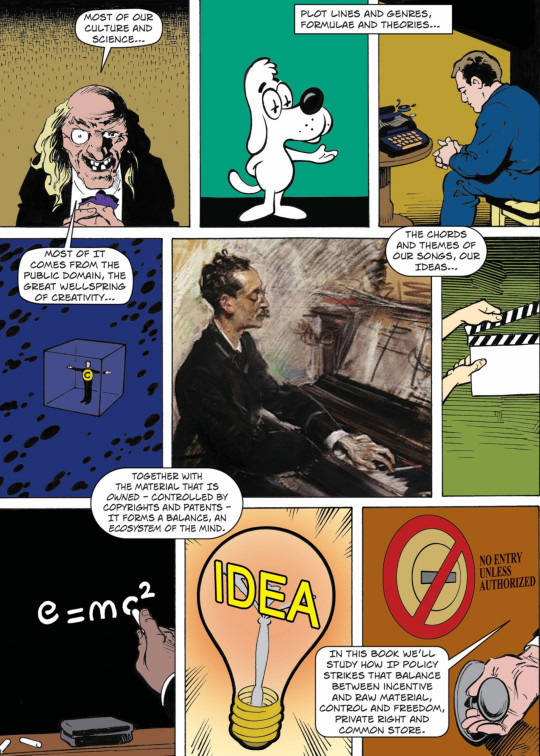
I'm coming to DEFCON! On Aug 9, I'm emceeing the EFF POKER TOURNAMENT (noon at the Horseshoe Poker Room), and appearing on the BRICKED AND ABANDONED panel (5PM, LVCC - L1 - HW1–11–01). On Aug 10, I'm giving a keynote called "DISENSHITTIFY OR DIE! How hackers can seize the means of computation and build a new, good internet that is hardened against our asshole bosses' insatiable horniness for enshittification" (noon, LVCC - L1 - HW1–11–01).

Few debates invite more uninformed commentary than "IP" – a loosely defined grab bag that regulates an ever-expaning sphere of our daily activities, despite the fact that almost no one, including senior executives in the entertainment industry, understands how it works.
Take reading a book. If the book arrives between two covers in the form of ink sprayed on compressed vegetable pulp, you don't need to understand the first thing about copyright to read it. But if that book arrives as a stream of bits in an app, those bits are just the thinnest scrim of scum atop a terminally polluted ocean of legalese.
At the bottom layer: the license "agreement" for your device itself – thousands of words of nonsense that bind you not to replace its software with another vendor's code, to use the company's own service depots, etc etc. This garbage novella of legalese implicates trademark law, copyright, patent, and "paracopyrights" like the anticircumvention rule defined by Section 1201 of the DMCA:
https://www.eff.org/press/releases/eff-lawsuit-takes-dmca-section-1201-research-and-technology-restrictions-violate
Then there's the store that sold you the ebook: it has its own soporific, cod-legalese nonsense that you must parse; this can be longer than the book itself, and it has been exquisitely designed by the world's best-paid, best-trained lawyer to liquefy the brains of anyone who attempts to read it. Nothing will save you once your brains start leaking out of the corners of your eyes, your nostrils and your ears – not even converting the text to a brilliant graphic novel:
https://memex.craphound.com/2017/03/03/terms-and-conditions-the-bloviating-cruft-of-the-itunes-eula-combined-with-extraordinary-comic-book-mashups/
Even having Bob Dylan sing these terms will not help you grasp them:
https://pluralistic.net/2020/10/25/musical-chairs/#subterranean-termsick-blues
The copyright nonsense that accompanies an ebook transcends mere Newtonian physics – it exists in a state of quantum superposition. For you, the buyer, the copyright nonsense appears as a license, which allows the seller to add terms and conditions that would be invalidated if the transaction were a conventional sale. But for the author who wrote that book, the copyright nonsense insists that what has taken place is a sale (which pays a 25% royalty) and not a license (a 50% revenue-share). Truly, only a being capable of surviving after being smeared across the multiverse can hope to embody these two states of being simultaneously:
https://pluralistic.net/2022/06/21/early-adopters/#heads-i-win
But the challenge isn't over yet. Once you have grasped the permissions and restrictions placed upon you by your device and the app that sold you the ebook, you still must brave the publisher's license terms for the ebook – the final boss that you must overcome with your last hit point and after you've burned all your magical items.
This is by no means unique to reading a book. This bites us on the job, too, at every level. The McDonald's employee who uses a third-party tool to diagnose the problems with the McFlurry machine is using a gadget whose mere existence constitutes a jailable felony:
https://pluralistic.net/2021/04/20/euthanize-rentier-enablers/#cold-war
Meanwhile, every single biotech researcher is secretly violating the patents that cover the entire suite of basic biotech procedures and techniques. Biotechnicians have a folk-belief in "patent fair use," a thing that doesn't exist, because they can't imagine that patent law would be so obnoxious as to make basic science into a legal minefield.
IP is a perfect storm: it touches everything we do, and no one understands it.
Or rather, almost no one understands it. A small coterie of lawyers have a perfectly fine grasp of IP law, but most of those lawyers are (very well!) paid to figure out how to use IP law to screw you over. But not every skilled IP lawyer is the enemy: a handful of brave freedom fighters, mostly working for nonprofits and universities, constitute a resistance against the creep of IP into every corner of our lives.
Two of my favorite IP freedom fighters are Jennifer Jenkins and James Boyle, who run the Duke Center for the Public Domain. They are a dynamic duo, world leading demystifiers of copyright and other esoterica. They are the creators of a pair of stunningly good, belly-achingly funny, and extremely informative graphic novels on the subject, starting with the 2008 Bound By Law, about fair use and film-making:
https://www.dukeupress.edu/Bound-by-Law/
And then the followup, THEFT! A History of Music:
https://web.law.duke.edu/musiccomic/
Both of which are open access – that is to say, free to download and share (you can also get handsome bound print editions made of real ink sprayed on real vegetable pulp!).
Beyond these books, Jenkins and Boyle publish the annual public domain roundups, cataloging the materials entering the public domain each January 1 (during the long interregnum when nothing entered the public domain, thanks to the Sonny Bono Copyright Extension Act, they published annual roundups of all the material that should be entering the public domain):
https://pluralistic.net/2023/12/20/em-oh-you-ess-ee/#sexytimes
This year saw Mickey Mouse entering the public domain, and Jenkins used that happy occasion as a springboard for a masterclass in copyright and trademark:
https://pluralistic.net/2023/12/15/mouse-liberation-front/#free-mickey
But for all that Jenkins and Boyle are law explainers, they are also law professors and as such, they are deeply engaged with minting of new lawyers. This is a hard job: it takes a lot of work to become a lawyer.
It also takes a lot of money to become a lawyer. Not only do law-schools charge nosebleed tuition, but the standard texts set by law-schools are eye-wateringly expensive. Boyle and Jenkins have no say over tuitions, but they have made a serious dent in the cost of those textbooks. A decade ago, the pair launched the first open IP law casebook: a free, superior alternative to the $160 standard text used to train every IP lawyer:
https://web.archive.org/web/20140923104648/https://web.law.duke.edu/cspd/openip/
But IP law is a moving target: it is devouring the world. Accordingly, the pair have produced new editions every couple of years, guaranteeing that their free IP law casebook isn't just the best text on the subject, it's also the most up-to-date. This week, they published the sixth edition:
https://web.law.duke.edu/cspd/openip/
The sixth edition of Intellectual Property: Law & the Information Society – Cases & Materials; An Open Casebook adds sections on the current legal controversies about AI, and analyzes blockbuster (and batshit) recent Supreme Court rulings like Vidal v Elster, Warhol v Goldsmith, and Jack Daniels v VIP Products. I'm also delighted that they chose to incorporate some of my essays on enshittification (did you know that my Pluralistic.net newsletter is licensed CC Attribution, meaning that you can reprint and even sell it without asking me?).
(On the subject of Creative Commons: Boyle helped found Creative Commons!)
Ten years ago, the Boyle/Jenkins open casebook kicked off a revolution in legal education, inspiring many legals scholars to create their own open legal resources. Today, many of the best legal texts are free (as in speech) and free (as in beer). Whether you want to learn about trademark, copyright, patents, information law or more, there's an open casebook for you:
https://pluralistic.net/2021/08/14/angels-and-demons/#owning-culture
The open access textbook movement is a stark contrast with the world of traditional textbooks, where a cartel of academic publishers are subjecting students to the scammiest gambits imaginable, like "inclusive access," which has raised the price of textbooks by 1,000%:
https://pluralistic.net/2021/10/07/markets-in-everything/#textbook-abuses
Meanwhile, Jenkins and Boyle keep working on this essential reference. The next time you're tempted to make a definitive statement about what IP permits – or prohibits – do yourself (and the world) a favor, and look it up. It won't cost you a cent, and I promise you you'll learn something.

Support me this summer on the Clarion Write-A-Thon and help raise money for the Clarion Science Fiction and Fantasy Writers' Workshop!

If you'd like an essay-formatted version of this post to read or share, here's a link to it on pluralistic.net, my surveillance-free, ad-free, tracker-free blog:
https://pluralistic.net/2024/07/30/open-and-shut-casebook/#stop-confusing-the-issue-with-relevant-facts

Image: Cryteria (modified) Jenkins and Boyle https://web.law.duke.edu/musiccomic/
CC BY-NC-SA 4.0 https://creativecommons.org/licenses/by-nc-sa/4.0/
#pluralistic#jennifer jenkins#james boyle#ip#law#law school#publishing#open access#scholarship#casebooks#copyright#copyfight#gen ai#ai#warhol
177 notes
·
View notes
Text
The Emergence of NFTs: Transforming Digital Ownership and Creativity

Non-Fungible Tokens (NFTs) have revolutionized the way we think about digital ownership, art, and collectibles. By leveraging blockchain technology, NFTs provide a way to create, buy, sell, and own unique digital assets with verifiable provenance and scarcity. This article explores the world of NFTs, their impact on various industries, key benefits and challenges, and notable projects, including a brief mention of Sexy Meme Coin.
What Are NFTs?
NFTs, or Non-Fungible Tokens, are unique digital assets that represent ownership of a specific item or piece of content, such as art, music, videos, virtual real estate, and more. Unlike cryptocurrencies like Bitcoin or Ethereum, which are fungible and can be exchanged on a one-to-one basis, NFTs are indivisible and unique. Each NFT is recorded on a blockchain, ensuring transparency, security, and verifiability of ownership.
The Rise of NFTs
NFTs gained mainstream attention in 2021 when digital artist Beeple sold an NFT artwork for $69 million at Christie's auction house. This landmark event highlighted the potential of NFTs to transform the art world by providing artists with new revenue streams and collectors with verifiable digital ownership.
Since then, NFTs have exploded in popularity, with various industries exploring their potential applications. From gaming and music to real estate and fashion, NFTs are creating new opportunities for creators, businesses, and investors.
Key Benefits of NFTs
Digital Ownership: NFTs provide a way to establish true digital ownership of assets. Each NFT is unique and can be traced back to its original creator, ensuring authenticity and provenance. This is particularly valuable in the art and collectibles market, where forgery and fraud are significant concerns.
Monetization for Creators: NFTs enable creators to monetize their digital content directly. Artists, musicians, and other content creators can sell their work as NFTs, earning revenue without relying on intermediaries. Additionally, smart contracts can be programmed to provide creators with royalties each time their NFT is resold, ensuring ongoing income.
Interoperability: NFTs can be used across different platforms and ecosystems, allowing for interoperability in the digital world. For example, NFTs representing in-game items can be traded or used across multiple games and virtual worlds, enhancing their utility and value.
Scarcity and Collectibility: NFTs introduce scarcity into the digital realm by creating limited editions or one-of-a-kind items. This scarcity drives the collectibility of NFTs, similar to physical collectibles like rare coins or trading cards.
Challenges Facing NFTs
Environmental Impact: The creation and trading of NFTs, especially on energy-intensive blockchains like Ethereum, have raised concerns about their environmental impact. Efforts are being made to develop more sustainable blockchain solutions, such as Ethereum's transition to a proof-of-stake consensus mechanism.
Market Volatility: The NFT market is highly speculative and can be volatile. Prices for NFTs can fluctuate significantly based on trends, demand, and market sentiment. This volatility poses risks for both creators and investors.
Intellectual Property Issues: NFTs can raise complex intellectual property issues, particularly when it comes to verifying the rightful owner or creator of the digital content. Ensuring that NFTs are legally compliant and respect intellectual property rights is crucial.
Access and Inclusivity: The high costs associated with minting and purchasing NFTs can limit accessibility for some creators and collectors. Reducing these barriers is essential for fostering a more inclusive NFT ecosystem.
Notable NFT Projects
CryptoPunks: CryptoPunks are one of the earliest and most iconic NFT projects. Created by Larva Labs, CryptoPunks are 10,000 unique 24x24 pixel art characters that have become highly sought-after collectibles.
Bored Ape Yacht Club: Bored Ape Yacht Club (BAYC) is a popular NFT collection featuring 10,000 unique hand-drawn ape avatars. Owners of these NFTs gain access to exclusive events and benefits, creating a strong community around the project.
Decentraland: Decentraland is a virtual world where users can buy, sell, and develop virtual real estate as NFTs. This platform allows for the creation of virtual experiences, games, and social spaces, showcasing the potential of NFTs in the metaverse.
NBA Top Shot: NBA Top Shot is a platform that allows users to buy, sell, and trade officially licensed NBA collectible highlights. These video clips, known as "moments," are sold as NFTs and have become popular among sports fans and collectors.
Sexy Meme Coin (SXYM): Sexy Meme Coin integrates NFTs into its platform, offering a decentralized marketplace where users can buy, sell, and trade memes as NFTs. This unique approach combines humor and finance, adding a distinct flavor to the NFT landscape. Learn more about Sexy Meme Coin at Sexy Meme Coin.
The Future of NFTs
The future of NFTs is bright, with continuous innovation and expanding use cases. As technology advances and more industries explore the potential of NFTs, we can expect to see new applications and opportunities emerge. From virtual fashion and digital identities to decentralized finance (DeFi) and beyond, NFTs are poised to reshape various aspects of our digital lives.
Efforts to address environmental concerns, improve accessibility, and ensure legal compliance will be crucial for the sustainable growth of the NFT ecosystem. Collaboration between creators, platforms, and regulators will help build a more robust and inclusive market.
Conclusion
NFTs have ushered in a new era of digital ownership, creativity, and innovation. By providing verifiable ownership and provenance, NFTs are transforming industries ranging from art and entertainment to gaming and virtual real estate. While challenges remain, the potential benefits of NFTs and their ability to empower creators and engage communities make them a significant force in the digital economy.
For those interested in the playful and innovative side of the NFT market, Sexy Meme Coin offers a unique and entertaining platform. Visit Sexy Meme Coin to explore this exciting project and join the community.
250 notes
·
View notes
Text
All or Nothing and lowave records
Strap in because this is gonna be a long one. This post will try to shed some light on how the whole lowave records thing works, how you can use this music, how it is being distributed, and what all a contract with lowave would include. All this and more below the cut!
Let us start with the basics: What is lowave records?
Quite succinctly summed up on their website as follows:
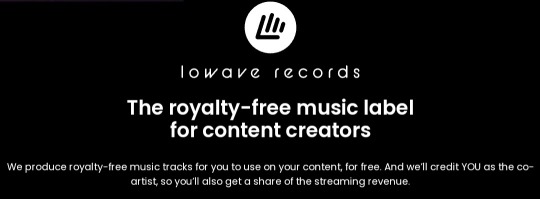
They make and distribute royalty-free music for content creators - specifically video-format content creators like Youtubers and streamers - they share some streaming revenue (30%, we'll get into that) with the creators who are labelled 'co-artists' and get promotion of their music through the content creators.
So, that brings us to the next big question: What is royalty-free music?
This is music that is free to use. Yes, by anyone, by Dan and Phil, by other creators, by you and me, any of us. This is by no means a new thing of course, anyone who has created content online would have come across other such services. just as an example, bensound.com hosts a large library of royalty-free music which you can use in any video by simply crediting the site in your description. Lowave works in a similar fashion. The music is not copyrighted. However, the rights to the music are held by lowave records and there are limitations on its use, which we will get into ahead.
How is the money working (preliminary edition)?
I will add details to this later when I discuss the contract, but let's see the info we get straight away from the FAQs: You do not have to pay them anything to make music for you

The money is coming in from the streaming platforms, depends completely on amount of streams, and is shared between lowave and the creators


Also from the FAQs: how can this music be used?
Anyone can freely use any of the music from lowave records, which means that yes, you can use any music from All or Nothing for your purposes with credit, it will not be taken down


Is this the only music we will hear on dapg now? Will there be more albums?
Not necessarily! This isn't an exclusive deal, DnP can use any music they want on the channel. As for new albums, seems like it depends on how this one does (and it seems to be doing quite well!) which will unlock future avenues for more collabs with lowave


Okay BASICS DONE if you're still reading you're probably here for the real meat so let us get into it
How is the money working (director's cut)?
Let us start with the terms on the partner agreement:
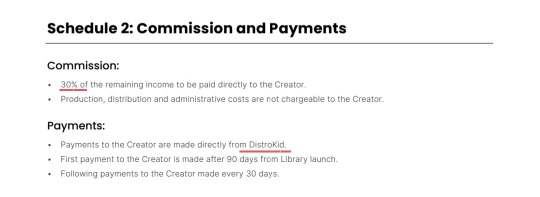
Content Creators get 30% of the 'remaining income'. This basically means any costs that streaming platforms are deducting, any processing fees, taxes etc will be deducted before the 30% share is calculated. The second point there basically means that the deductions here do not include business expenses of the label itself, ie when the label calculates its own profit production costs and various other expenses are deducted from the income, but these costs will not affect the revenue received by the content creators (You are probably already thinking 'how is this company earning enough to keep going?' and I will touch on that later as well)
Payment installments are simple enough but here we see a third party enter the chat: DistroKid. Who is DistroKid and why are payments going through them, Hazel? I hear you ask. Well I'll tell you dear readers:
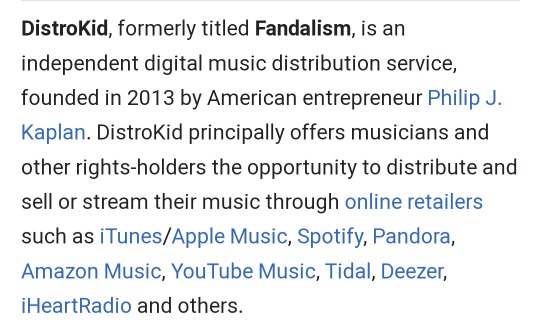
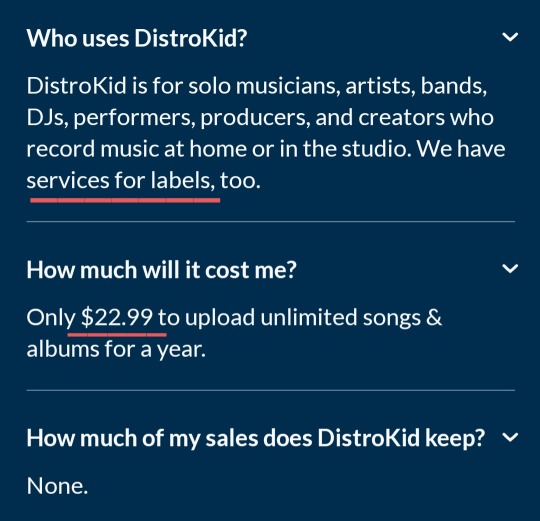
It is basically a service that takes a yearly fee for putting your music on streaming platforms efficiently and then pockets 0% of the royalties. The royalties go from the streaming services (eg Spotify) to DistroKid who then send it to the rights-holders (in this case, lowave records). lowave records is using this service for a yearly fee to upload all their music through.
But wait! If DistroKid is working with lowave, and lowave owns all the rights, why is DistroKid making direct payments to the content creators?
Well, over the years they have offered a bunch of services:
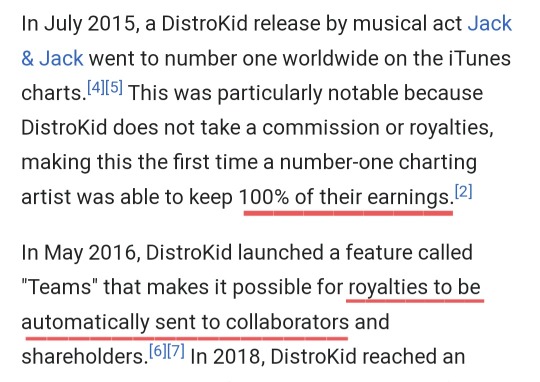
I am guessing lowave is making use of the teams feature to send royalties owed to content creators ("collaborators") directly from Diskworld, which makes sense, the less people money goes through the less chances of mishandling.
People have of course been talking about what percentage Spotify even pays for many many years. The short answer: we don't know for sure because it is confidential, Spotify won't tell and artists aren't allowed to. The longer answer: people have estimated from a bunch of publically available data that the share seems to be 70-30 (rights-holders- spotify).
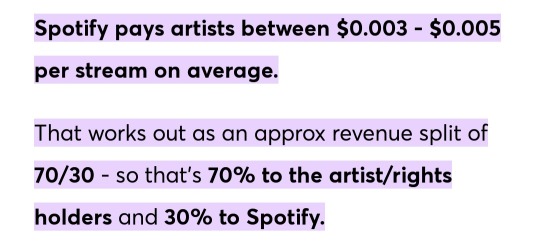
However spotify is not paying per stream anymore so that makes these figures harder to pin down. they are using a 'streamshare' system which is much more convoluted:
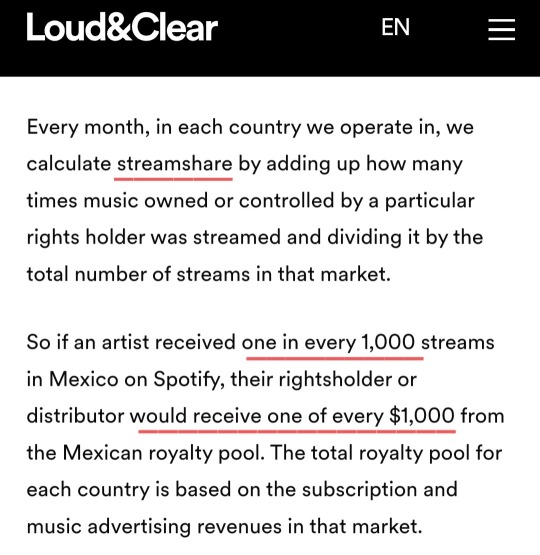
That was all about the money, now let's talk Licensing
Creators can use this music in any capacity, and do not have to share any of the revenue from their own content with lowave. They have put a stipulation that it may not be used in a way that is "illegal, immoral, discriminatory or derogatory to [lowave]" but what constitutes 'immoral' and 'discriminatory' is not really defined.
The other limitation applies to the contracted Content Creators only as far as I can tell: they are not allowed to remix, sample, or edit these songs without prior permission. This probably only applies to altering the songs and playing under the same name, so fan remixes should not run into issues here, as long as they are not monetised. (thanks kate @goldenpinof for making me think about this part a bit more, I think it should be safe, but even royalty free music cannot be transformed without permission at least in a commercial capacity)
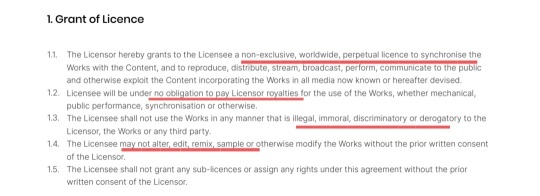
They will also make more music free of cost if the streaming targets they set are being met by the albums produced. The process:

Other services they provide will be handling the creator's account which they set up (DanAndPhilBeats in this case) on streaming platforms and making changes as required, so the Cheeky Banter -> Project X thing was probably done from their end, possibly an older change that they forgot to update?
Also below are promotional obligations:
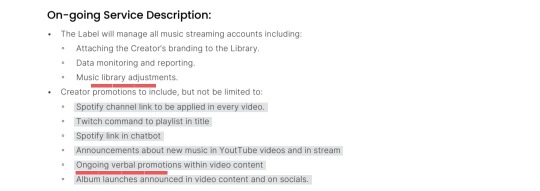
The promotion wasn't a one-time thing, it is expected to be ongoing, so we will probably be hearing about this in future videos as well. However, later in the partner agreement it is added that this has to be done as often as possible in a way that is "natural and appealing to their audience" which again, is pretty vague wording

Also the licensing goes both ways, so lowave can also use segments of the content DnP make that has the music in the background to promote their music:

Additional stuff from the contract:
lowave takes the guarantee of creating original works that it has the rights to and which do not infringe on copyrights, and the creators likewise take the guarantee not use the songs in content which infringes copyright. If there are any disputes regarding such infringement in the future the record and the creators have to back each other up (including sharing legal fees)

I mentioned before some parts of the agreement being written in vague language. There is also a clause that says if any provision ends up being illegal/not possible to enforce by a court (eg if a court were to it's impossible to say whether content featuring the songs was 'immoral') then only that provision will be removed, the rest of the contract stands.
The waiver part basically means that if any of the parties decide to not sue or forgo a complaint about breach of contract, that does not mean that those provisions are now unavailable, they can still sue later on or for some other breach if they wish.

That's the contracts done. Some of the framing there makes it seem to me like it's a pretty small company. The revenue they hope to generate does not seem to be very sustainable, especially since the revenue is being shared with content creators but the cost is not and they are additionally paying for other services like DistroKid.
So I looked more into this record label: they started business in 2022. If you go to their socials though, twitter and instagram they have followers in double digits and post very sparsely. Their tiktok seems to have nothing on it at all (thanks @lesbiandanhowell for the screenshot) and you may have noticed, Dan did not tag the lowave account at all when he announced the album on twitter

The agreement never mentions creators promoting lowave's social channels or tagging them either (and it is quite odd, I have worked with a bunch of organisations in their infancy and this is, now more than ever, a common requirement from collaborators). lowave records does not seem to be actively working towards promoting themselves on social media or building an online presence, even though they have been operational two years producing music throughout.
There are three people involved with the company on public record:
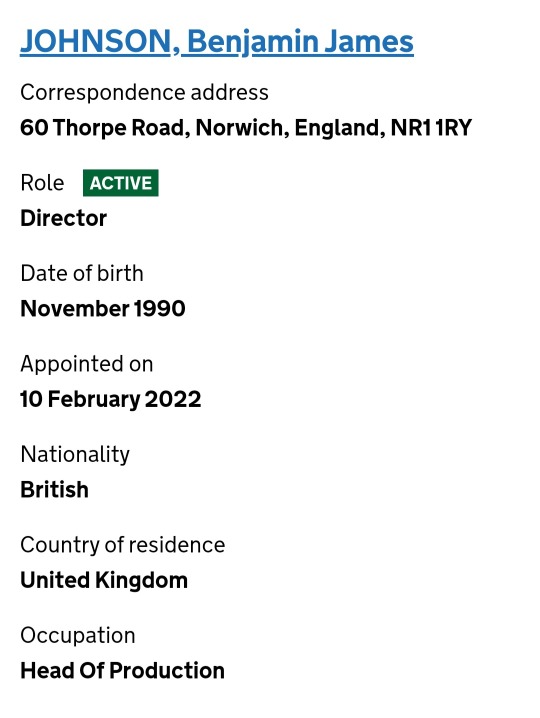
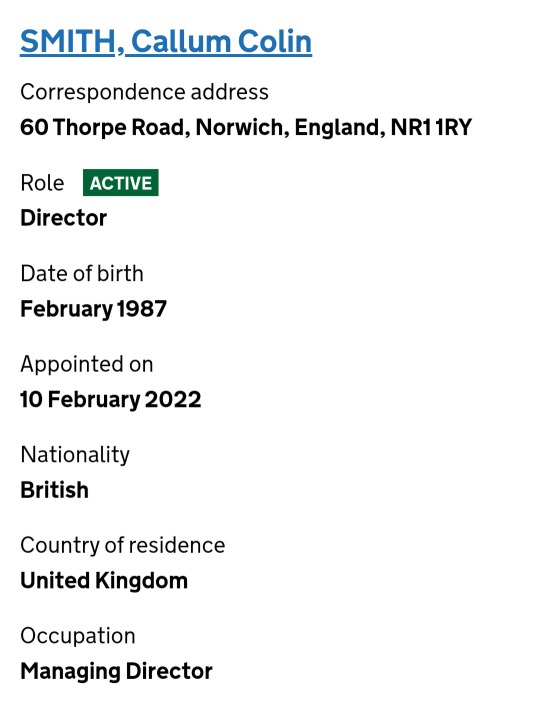
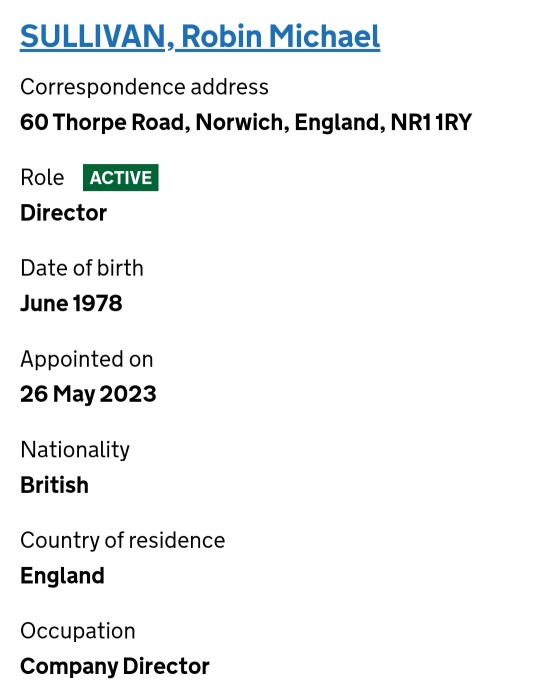
Benjamin Johnson listed as 'Head of Production' is probably the 'Ben' Dan has been talking about who made the songs. Seems like their scale of operations is not very big and possibly not a lot of producers in the records at all (despite the spotify page saying they have 'producers' plural, but that doesn't have to mean a lot many lol). Anyway, that would solve the mystery of 'how are they playing their employees?' if there aren't many employees to begin with (not even an intern to manage their social media it seems).
Look at the last person in the screenshots though: Robin. I looked at what other companies Robin is associated with and several of them - yeah several different operations that he's involved in - have the same correspondence address of '60 Thorpe Road...', so probably operating out of a ghost office (just to have a registered address and receive mail at etc). And one of these businesses that Robin is associated with is RWD, the business that made lowave records' website for them:
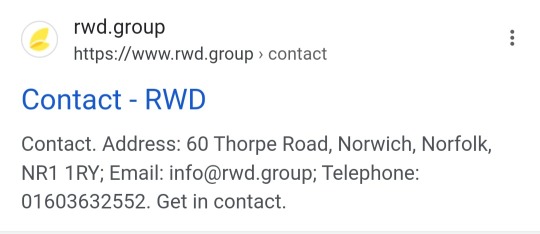
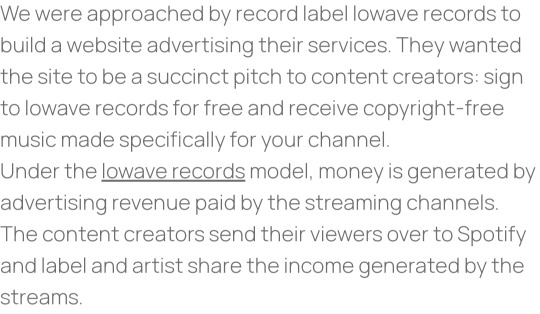
The no-cost production of royalty-free music, little attention to social media presence, vaguely written contract, seemingly small scale of operations with technical assistance like website design coming from an affiliated organisation makes me think that lowave records might be a side project. A labour of love, possibly, hoping to sustain itself enough to keep putting out royalty-free music in a time of extreme crackdown on copyrighted music use.
It makes sense to use content creators for promotion, gets you way more streaming than making your own music and putting it out. And the incentive of unique but guaranteed royalty free music at no cost is great for content creators of all sizes. It is far from sustainable on its own though, especially with streaming revenue being basically peanuts, and I do not think there's much interest in gaining a following or putting in that effort either, so it's probably a very small business by a few people. How long it manages to sustain itself as a project I am not sure, but it certainly isn't looking like something particularly geared towards profit and growth in its current state.

We are at an end! If you read this far, leave me like an A+ or a star for my essay so I can have academic validation from this please. Of course I probably have not covered everything possible in connection to this so if anyone has more info feel free to add on! And if this was all very long and there's something particular you wanted to know you can drop an ask into the inbox about it!
Thank you for coming with me on this journey! Back to the important things, which was your favourite song from the album? I think mine is Arcade Admission
#dnp#dan and phil#dnpgames#dan and phil games#meta#?#all or nothing#lowave records#dan howell#phil lester
261 notes
·
View notes
Text
I'm fully prepared to get crucified for this, but the current situation with Liam Payne and by extension his son Bear is actually a really, really good live example case of misguided activism.
On every single post about Liam or One Direction I'm seeing people encouraging others to stream music because "the proceeds go towards Bear!"
And its a lovely, genuine sentiment, but I also need people to understand something.
That child is already now, legally, a multi-millionaire. That child now has stocks and royalties in a band which revenue-wise will never die. That child has four other multi-millionaire Uncles who will ensure that he never goes without so much as tissue to wipe his nose.
"We need to stream Liam's music 24/7 to raise funds for his son!" is both the loveliest and stupidest activism I have seen in a while. And its an amazing example of wasted activism. That child already has more funds in his name than the vast majority of us will ever see in our lifetime.
At the time of his death, it was (loosely) estimated that Liam Payne left a net worth inheritance of around $70,000,000 to his son. Seventy. Million. And that's not counting the uptick in royalties over the next 1-2 years as 1D and Liam merchandise and streams soar.
Seventy. Million.
And my point is, its such a classic example of how people allow emotional investment and assumptions to cloud proper judgement and consideration. Nobody is thinking beyond "child has tragically lost a parent" and nobody who has wants to be seen as the asshole who points out that the child doesn't actually need any of this good-faith effort and that actually, it would be far better to dedicate your activism toward mental health, drug and alcohol recovery.
Bear Payne does not need your activism or your money.
But the people who have suffered like Liam Payne did do. If you genuinely think what happened to Liam is so tragic, aim your activism at actual avenues that can help prevent other children losing parents. Other families losing loved ones. Other people mourning preventable losses.
46 notes
·
View notes
Text
jynx absolutely fascinates me as a game dev because they're like. inspiration but in the opposite way of literally everything they've ever done
jynx decided they want to make touhou-like shmups, and decided to approach this by building most patterns around extremely fast bullets relying entirely on player reaction or having already seen a pattern before, infamously the most disliked and player-antagonistic way of approaching bullet hells
jynx added a great iteration on touhou-like shmups with flash bombing, an infinitely regenerating way to clear bullets if you put yourself in active danger in contrast to the use of bombs as a safe but finite resource, and then made sure you could only use it if you aren't focusing your shots, which you spend over 90% of a touhou-like doing
jynx created "absurdly extra" stages just as a complete fuck you to the player. half of them are humanly impossible to complete
jynx's version of character development is to add more characters. jynx will drop one of the most fascinating backstories you've ever heard that has groundbreaking and sweeping impacts on len'en lore, yet somehow being entirely consistent with it, and then proceed to do literally nothing and minutes later introduce another character with one of the most fascinating backstories you've ever heard. len'en has 40+ characters and all of them have been in perpetual Big Things Are Coming hell for over half a decade
jynx has spent over an alledged 15 years working on the world and lore in mugenri and the outside world, desperately wants to share this and continually mentions the short stories and lore dumps they write, which we never see, because they have somehow convinced themself the only way to show this story is through touhou-likes, which are notable for showing "story" as an excuse for people to shoot bullets at each other
jynx treats feature creep like an arms race. there isn't a single idea they come up with that doesn't end up in a game or is planned to at a later date. len'en 4 is still technically unfinished despite it having enough paths to dwarf all the previous len'en games combined thrice over and featuring the entire cast of the series in it (i will stress again, 40+ characters), and they've promised a dlc with even more stuff to do
jynx wanted to make a mobile cafe management simulator after having made nothing but bullet hell shmups on pc, just because it sounded fun, realised their previous tools couldn't make mobile games well, realised they'd be going in entirely blind on a new tech stack, realised they'd be going in blind on a genre they have no experience with, decided to tag on a second entire game to the cafe management with a turn-based rpg, realised they also have no experience with that genre, continued anyway, learnt how to use unity from the ground up, realised the multitude of issues unity development brings, decided every single character also needed to be in this one with unique boss battles, realised the problems of having 40+ character assets and 5min+ music themes in a mobile game that very infamously is a platform you need to stick to strict asset and tech limitations, decided to stream in assets from a server, made it a live service game because it would be online and that was an obvious next step, stuck through it, totalling in five years of dev time to make a full "gacha" game that is generous beyond belief and makes them a net zero in ad revenue vs server costs
jynx iterates nothing. literally everything you see in their games is the first go and if it sucks, too bad
jynx creates all their music with default fl studio sounds and the touhou trumpet. everything's unmixed. they earnestly believe that loud = better
jynx, allegedly, "blacks out" when making music after hitting some kind of flow state, and wakes up with a complete track. like everything else, these are never iterated on
jynx wrote the entirety of len'en 4's 100,000+ word script in one week. i don't even have a funny comment for this one
jynx doesn't think len'en would fit the format of a visual novel despite the fact len'en 4 has a 100,000+ word script
jynx refuses to collab with anyone for any reason. motives unclear
jynx did three 12 hour back-to-back livestreams crunching to finish book of the cafe. literally no part of this is a good idea
jynx is like the quintessential representation of everything you shouldn't do as a game dev. they should have burnt out years ago and been remembered as nothing but a random quirky touhou ripoff that was an interesting yet janky interpretation but ultimately went nowhere and YET here we are coming in to len'ens decade anniversary
how the fuck is jynx a real person. why am i so obsessed with everything they've ever made
#txt#len'en#this started as like 2 sentences then ballooned#i have many thoughts about jynx as a dev
280 notes
·
View notes